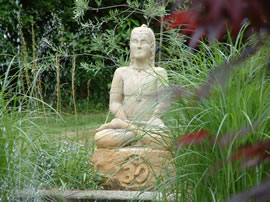Viveka – Discrimination – Vanessa Graham
Real discrimination is to tell the original basic Truth from the every changing names and forms It assumes (Bk2v26), but how can we do this? We can develop our own discrimination faculty (viveka) which comes from our buddhi (intelligence) to determine what is beneficial or detrimental to our spiritual lives.
We live in a material world based on consumerism where we continually desire material goods. Desires can also cover material wealth and people, whereby when a desire is fulfilled it is replaced by another. There is a constant search for acquisition that can never be sated. The same has been happening for thousands of years and Patanjali highlights this in his sutra (Bk2v15) in that we need to become a person of discrimination (vivekinah).
He points out that desire and craving catch you in a web of pain and pleasure. Pleasure when your desire is satisfied but painful when it is not. Possessions can become very important whereby your identity can be formed by them i.e. your car, house, work status etc. There develops an anxiety over maintaining them and fear for their loss, these being painful experiences. Past pleasures can become painful when they renew cravings in the mind and a continuous circle of desiring develops. Note when a desire is not fulfilled and when someone else has the object of desire, how envy develops.
Our desires become painful (dukhair) because of our attachment to them and our fearing of losing them. We spend our lives swinging from the painful to the pleasurable (sukhair) and this creates imprints in our mind (samskaras) which never give us peace of mind. The same with the gunas, between the extremes tamas and rajas (lethargy-energetic) we need to look for the middle sattvic path, where we will not be disturbed by desires or cravings.
When man identifies with his body, mind and senses, he believes himself to be an isolated individual. Through ignorance he has lost sight of his true nature that his is Atman, the Spirit. He is searching in the wrong direction for lasting happiness, instead of always seeking it in outward gratification there needs to be a turning inwards. To dwell in the heart centre where the presence of God can be felt directly. Atman is motionless and actionless, it is the witness of everything. When resting in the Atman the personal senses can move among the sense objects but remain free from all actions. It is actionless in the midst of action, where one can be free from all desires. Our ego is the main obstacle to us experiencing the Atman but with the disciplines of discrimination and dispassion it can be realised
We can live in this world but not be a part of it, experiencing the material around us with gratitude but non-attachment (vairagya). Not to cling to objects or people for one’s own aggrandizement or sole use. Discrimination is needed where we stand back in our witness (drastuh) and observe these wants. Sharing and living for others reaps its own reward. Use your viveka to discriminate your thoughts and actions as to what is beneficial or not.
We do not need to renounce this world but to learn to live within it with discrimination. Family life is the ground for learning to develop spiritually. It provides many teaching opportunities whereby we can grow spiritually. Be part of the world but not of it. Whilst we are part of it, the mind needs to be steadied and not tossed by desires, not getting caught in the web of desires. Start to eliminate these distractions and they will no longer have a hold over you.
At the same time moving away from the personal to the universal viewpoint. To seek what is permanent and everlasting, which is ever present and ever available. That which never changes and is found in the depths of silence and stillness. To refocus the mind on the Truth (the Real). The pranava, the sacred Om (sounded A-U-M) can be used as a bridge from our physical world (sounding A) moving into the subtle world of the mind (sounding U) and then into the deeper depths of Being (sounding the nasal M, vibrating at the top of the nostrils). Sounding the AUM (keeping it short) creates a fine vibration which travels through these layers and beyond. It is a journey from the Unreal, our world of every changing names and forms, into the Real, the depths of Being.
Viveka was the theme for the April satsang where we seek to understand the ancient teachings. There is a different theme each month where the subject is open for discussion. Vanessa is available on vanessaegraham@aol.com to answer any queries.
